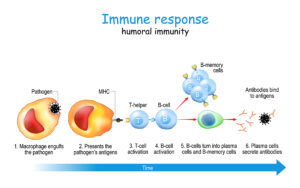New research with lymph node biopsies showed that the immune response following the Pfizer vaccine lasts much longer than previously assumed. This publication is based on a research paper date June 29, 2021 in Nature.
US researchers at Washington University School of Medicine in St. Louis did lymph node biopsies under ultrasound guidance. They took some of the biopsies on patients with prior Covid-19 infections (before their first dose of their Pfizer vaccine). Researchers also took lymph node biopsies from 14 subjects who received both vaccinations.
The first samples were harvested just prior to the second vaccine (week 3), the remainder on week 4, 5 and 7, counted from the first vaccine. In all of the 14 samples 3 weeks after the 1st vaccine germinal centers with B cells producing antibodies were observed.
Lymph nodes with germinal centers
Other studies showed that germinal centers in lymph glands play a pivotal role in antibody production. There B cells (bone marrow processed lymphocytes) in cooperation with T-helper cells produce specific antibodies against a protein. In the case of the SARS-CoV-2 vaccine from Pfizer it is the mRNA of the vaccine. The germinal centers of lymph nodes also contain B memory cells that are important for the continued production of antibodies against certain infections. There are distinct differences.
Long lasting vaccine and vaccines that need booster shots
For instance, smallpox is one of the infections where one vaccination provides lifelong immunity against this infectious disease. But many other vaccines last only for a few years and booster shots are necessary. This is the case for pertussis, tetanus and diphtheria. With mRNA vaccine like the SARS-CoV-2 vaccine we are still in the learning curve. So far the assumption was that two vaccinations would last about 6 months. There is a difference between the two immune responses. With a lasting immune response there are memory B lymphocytes that continue to produce B lymphocytes. These produce antibodies, which are missing when the vaccination is short lived. The difference is all about a lack of memory B lymphocytes.
Results of the Nature study regarding the SARS-CoV-2 vaccine
The researchers detected that after 3 weeks of the Pfizer vaccine B cells produced specific antibodies against a protein from the SARS-CoV-2 vaccine. The immune response from the booster shot after 21 days was stronger than the immune response after the first shot. The researchers of the Nature publication found that the immune response expanded after the booster shot and then stayed high. Even 15 weeks from the first shot there was still an active immune response. In addition, people who had a prior covid-19 infection showed still higher immune responses. This was apparent when individuals with a prior Covid-19 infection were vaccinated with the Pfizer vaccine. Their immune response was much more pronounced in comparison to those who did not have a prior Covid-19 infection.
Conclusion
A US research group from St. Louis investigated the immune response following vaccination with the Pfizer vaccine. They used a lymph node biopsy technique that showed the germinal centers in lymph glands. With this technique they could determine the antibody response of B cells and measure the specific monoclonal antibodies to the spike protein of the SARS-CoV-2 virus. Initially researchers thought that the immune response would settle down after a few weeks. However, at 15 weeks from the first vaccination the immune response was still strong. The researchers think the immune response following a Pfizer vaccination against the SARS-CoV-2 virus is similar to the smallpox virus rather than a short-lived vaccine against whooping cough. Future studies may be repeated several years from now to see whether the immune response is still robust.







